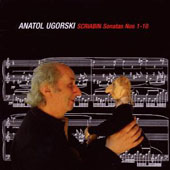
ESSENTIAL RECORDINGS

A genius or a crazy eccentric? A true visionary or a clever charlatan? Whatever your perception of Alexander Scriabin (1872-1915) might be, one
thing is for sure. His music, or rather his conceptualization of music, is unique. It resides on a higher level. It feels as though if one could break down his music into
a mathematical formula, the result of that calculation would reveal the secrets of the universe. The rapid evolution of his writing style and technique within his short
life is staggering. He quickly dismissed form to concentrate on substance. Already apparent in his Sonata No. 1, Op. 6 is the constant use of small
motivic cells that he scatters all over the work to great effect. The first two notes of the first movement, or at least the interval between those two notes, is the main
motif on which he builds an impressive edifice. Also obvious in this early work, is his use of extremes in dynamics. The second sonata, the Sonata Fantasy,
Op. 19 and the Sonata No. 3, Op. 23, both demonstrate his extended harmonic relations, his uncovering within the music of remote
harmonies and odd progressions. His strong belief in music's metaphysical capacities was already developing. In his Piano Sonata No. 5, Op. 53, the
unusual expressive markings begin appearing. Languido, accarezzevole, presto tumultuoso esaltato, allegro fantastico, estatico, con luminosita. And in
the Sonata No. 6, Op. 62 those markings, now in French, are becoming stranger. Ailé (winged), avec une chaleur contenue (with a contained
heat), concentré (concentrated), le rêve prend forme (the dream takes shape), l'épouvante surgit (fear strikes) and so on. This is the sonata in which Scriabin
claimed to have discovered a satanic chord. And in the few remaining sonatas, his own harmonic language arises, and form and structure are replaced by some sort of
musical nirvana. Add to all this the fact that most of these sonatas are considered extremely difficult to play and master, and that not every pianist can bring out their
qualities, and you have quite a monumental task ahead of you when recording them all.
Russian pianist and teacher Anatol Ugorski has just spent the last three years doing just that. Following a string of very well received recordings he
did for Deutsche Grammophon in the early 90's, he decided to retire from performing and recording to concentrate on teaching, but after a hiatus of about fifteen years,
he felt it necessary for him to put down his own thoughts and views on these amazing works for the piano. His approach is very much cerebral, with a strong focus on
details. Unlike some other pianists who would almost catch fire in some of the faster movements, Ugorski adopts slightly slower tempos in favor of content over flash.
The profound beauty within the music is always on display, as well as the emotional context, although he doesn't attain the beatific levels reached by some in certain
passages. You can always tell that he has completely assimilated this music over time, and knows all of its intimate details, and by simply accentuating all the right notes,
and using the dynamics effectively, he creates the momentum that carries the music aloft. The piano (apparently Vladimir Horowitz's instrument) sound is solid throughout
and CAvi-music have well captured the extremes in dynamics and the warm sonorities of this fine instrument.
Alexander Scriabin's music is for those who want to expand their musical world. It is a 'trip' deep within music's vortex from which you may never escape. Those who
listen to music as a 'divertissement' need not apply!
Jean-Yves Duperron